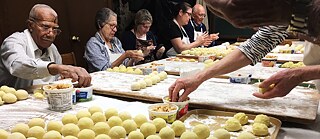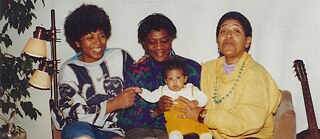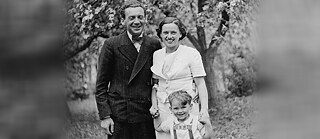Where Do You Belong?
Community
Community is the story of our lives. It is who we are, who we have been, and who we hope to become. Melissa Gerr visits Jewish congregations in Baltimore, Maryland, and Dresden, Germany, where she speaks with members about the importance of community.
Listen to this episode: Apple Music | Spotify | Download
Audio producer Melissa Gerr lives in Baltimore, Maryland, and captures sounds and stories in the world around her. Her previous pieces for the Goethe-Institut have profiled mothers in Germany and the U.S. and the congregation at Zion Lutheran Church. In this episode, Melissa explores the idea of community through her perspective as a Jewish woman, taking a close look at two Jewish communities: Beth Am, a synagogue in Baltimore, and the Besht Yeshiva, a Jewish educational institution in Dresden. In addition to this story, Melissa Gerr also produced the episode “Wonder” for THE BIG PONDER. Most of the music for this episode comes from Blue Dot Sessions. Melissa recorded the chants and hymns at the Beth Am Synagogue and the Besht Yeshiva.
Transcript
Melissa Gerr: This is Melissa Gerr for THE BIG PONDER. Have you ever tallied up how many communities you feel akin to? And it’s so closely related to identity. I mean, I’m a woman, I’m Jewish, I’m white, I’m Minnesotan, but also a Baltimorean. I’m an artist, I’m a nature lover. It’s a human desire, a need really, to seek community. Because finding your people provides a lot: a sense of belonging, a sense of safety, sometimes even inspiration or solidarity.
[SOUNDS OF CHANTING: BLACK LIVES MATTER, BLACK LIVES MATTER, BLACK LIVES MATTER]
Community might develop from sharing a space, like a neighborhood or a university, or it can spring from a shared identity or shared beliefs, like a religion or a political party. But what does it feel like when, for whatever reason, your sense of community goes awry, and your community turns its back on you or you turn away from your community? In a few minutes we’ll hear why some young, ultra-Orthodox Jews fled their tight-knit communities only to come together on another side of the world in Dresden, Germany, united by a common bond. But first — what happens, what does it feel like when your community turns its back on you?
[MUSIC]
Harriette Wimms: I’m sure that that security guard was doing their job, which was to protect a holy place, but what was communicated in that action was: I’m not part of that holiness.
Melissa Gerr: That’s Dr. Harriette Wimms, describing what it felt like when her presence was questioned upon entering a synagogue, where she was a member. She’s Black, and she’s a psychologist, a professor, and an organizing member of a growing community of Jews of Color in Baltimore, Maryland. Jews of Color have always existed, but across the U.S., there’s a growing awareness of the community and their experiences. A recent survey called “Beyond the Count” shows that about 15 percent of American Jews identify as Jews of Color. And even though they feel a strong sense of belonging within Jewish communities, there’s an astonishing 80 percent who have suffered racist comments, actions, and discrimination in Jewish settings, especially in houses of worship. Things like being mistaken for cleaning staff or caregivers or the constant burden of being questioned about their presence — just to name a few. But why is it happening?
[SINGING JEWISH PRAYER]
Melissa Gerr: Dedication to social justice is a prevalent theme in Jewish writings and teachings. In fact, the command to welcome the stranger appears 36 times in the Hebrew Bible. One synagogue that strives to embody these teachings is Beth Am congregation in Baltimore’s Reservoir Hill neighborhood. It’s led by Rabbi Daniel Burg. Beth Am members — which include several Black, Brown, and mixed-race families — are drawn to the synagogue because of its dedication to living out those Jewish ideals. So, I asked Rabbi Burg how something so foundational to Judaism like welcome the stranger could really go off the rails when it came to embracing Jews of Color in our midst.
Rabbi Daniel Burg: I think we’re trained as Jews to think about the other and our responsibilities to the other. And we do quite well when we’re thinking about somebody who appears different, who comes from a sort of radically different socio-economic level, who, you know, has a different level of education. I think that is our kind of comfortable place, where it’s more comfortable for us to be able to reach out to those individuals, serve them, take care of them, respond to their needs. What’s more complicated is when we increasingly recognize that otherness exists within the tent, right? Within the community. And in some ways, it doesn’t compute because we say: Okay, wait, we’re supposed to be welcoming to the stranger, but that person seems stranger than I am. And yet, they’re, you know, my brother, my sister, my co-congregant, somebody who counts in the minyan in the quorum for prayer just like I do. And that is, I think, the disconnect that we see sometimes that was exposed in that study, right? People who are Black Jews, and then get interrogated by white co-congregants asking, you know, When did you convert to Judaism, or can I help you find the page in the prayer book? Assuming that they know less just because they’re people of color, right? And so like, what’s the kind of paradigm? How do we, what are the sources and the framework that we need to begin to look at to say: Right, we’re not talking about the stranger here, what we’re actually talking about is diversity within the Jewish family. [MUSIC] And how do we relate to each other as individuals with different perspectives, backgrounds, and also races, genders, sexual orientations, but as fellow Jews? And that’s hard because our strengths are our weaknesses. As is the case, I think, for all people in this world, right? So, when your strength is tight-knit community, you do really well at taking care of that community. But by definition, that means that certain people are excluded from that community. And how do we sort of recalibrate to being more inclusive of those already within our ranks? And that’s not easy.
Justin Fair: Whenever someone says to me that I look Israeli, I just joke that, you know, the African side of me and the European Ashkenazi Jewish side unlocked the Semite from Mount Sinai, you know. [LAUGHS]
Melissa Gerr: That’s Justin Fair, he’s a Beth Am member. His father is Black, and his mother is white and Jewish. His parents made sure Justin and his brothers were steeped in both cultures and raised them as Jews. Now, Justin is often called upon to be a young voice for the growing Jews of Color community. He feels hopeful.
Justin Fair: It’s talked about openly in services. It means a lot to me because for so long, I would grow up and feel like I was the only person there who felt othered. And I think congregations, when they say all are welcome here. That means they should recognize that they’ve got people in their own midst who may not be coming up and speaking up because they might not feel welcomed. For me, being a Jew of Color has meant — one: adopting that term. Not everybody likes that term. I like the term, but it’s recognizing that like, yeah, I can use this to grow and to be seen. We have a responsibility. That’s what we’re being taught. Well, there’s a couple, an older couple, who attend services regularly. Back when I was attending Saturday morning services pre-pandemic, they used to always dress up to the nines — older Black couple, very stately — but they’re also really friendly, wonderful, like warm. And for me, it was like seeing them regularly was like my invitation to be reminded that like, oh, yeah, these folks exist. I don’t have to start a new thing. I just have to add to it.
Harriette Wimms: Community is, I think, the story of our lives. And what’s interesting is that we, of course, influence our community, but our community reflects back to us who we are. It’s our self-concept. So, it’s incredibly important to me because it is who I am, who I have been in the past, and, I think most importantly, who I hope to be in the future.
Melissa Gerr: That’s Dr. Harriette Wimms again. When she was six years old, she declared to her devout church-going mother that she didn’t believe in organized religion, so was no longer interested in attending church. It didn’t go over well. Even at that young age, Harriette was curious and determined to educate herself and to appease her mother who wanted her daughter to embrace the teachings and discipline of religion. As she grew up, Harriette explored a wide array of religions. Then, a friend invited her to attend a Jewish service.
Harriette Wimms: And I walked into that service and the ‘hazzan,’ the prayer leader, was singing. And in Hebrew. Of course, I didn’t understand a single word, but it felt familiar. I felt at home, and I started going every Friday night. And then, I talked to this rabbi about conversion. I did my due diligence. I went around to a bunch of other synagogues just to see and came back and said this is the one. And then, it so happened that I became a ‘Kohenet’-in-training, which is a Hebrew priestess, and the Kohenet Training Institute focuses on supporting feminist Judaism that is earth-based, that is collective, that is focused on social justice. And through that training program, I connected with my current rabbi, Arianna Katz, and Hinenu Baltimore Justice Shtiebl. And I’m with my people. I am with my people!
Melissa Gerr: Feeling so connected — finally — to a religion and a community she had long searched for, it’s easy to understand why — when Harriette does experience discrimination and ‘othering’ from within that community — the sting is even more harsh. Enter the Jews of Color Initiative. It’s a nationwide network that connects Jews of Color to education, support, and community. In 2018, Harriette attended her first event.
Harriette Wimms: There were like a couple of dozen Jews of Color in that room, and I said, where have you been? You’re my family. So, here were all these people that looked like me, and they were Jewish. And I thought: How do I reach these people? So, I came home, and I’m a big Facebook user. And I started exploring, connecting to other Jews of Color. And lo and behold, there were all of these groups and people who were working toward justice and inclusion and liberation for Jews of Color. And then in October 2020, sitting on my sofa, and I thought, I need to get us together. And I typed into Facebook, hey, anyone want to do a shabbaton? D.C., Maryland, Virginia. And all these people who I friended were saying oh my gosh, yes. From Cleveland, from Minneapolis, Los Angeles, Boston. What was the most powerful is that I probably had one-on-one Zoom calls with 50 Jews of Color across the country who were all leading initiatives. And in my mind, I thought, now, wait a minute. I’ve been Black all my life. I’ve been Jewish now for almost ten years. How can this be brand new to me? And what can I do to elevate these organizations? What can I do to honor them and also to bring people to those organizations and those organizations to people? And again, sitting on my sofa, just thinking about it, and the name came back to me: ‘Mispacha’ — family. So, I created the Jews of Color Mispacha Project with the goal of community. There’s also something that brings us together, which is the experience of otherness that we have all had that experience of being asked: Are you so and so’s nurse? Can you put more paper towels in the bathroom? Where should I hang my coat? And that there’s healing coming together, not just to talk about those challenges, but also to revel in the joy: the joy of Judaism, the joy of being a Jew of Color, and that we don’t have to leave any part of us at the door anymore. We get to be all of it.
Melissa Gerr: Channeling the joy of Judaism and mobilizing a powerful community within a community has enriched Harriette’s Jewish life, but there are still lots of things she and other Jews of Color want their white co-congregants to get straight. Here’s Justin again.
Justin Fair: There’s a sort of a meta guilt trip, Jewish guilt trip going on, I think, in the wider community of folks sort of waking up and realizing that their religious side is married innately to their political, to their civic sides, to their social sides. It’s okay to be awoken. And it’s natural, I think, in a progression of a culture to take ownership of that, and I’m grateful that we are. But also it’s not enough yet because at the end of the day, the programs are still about just being a Jew of Color or just being about ableism or just being about gender equity. When we start to see people employed in those roles, when we start to see those elements introduced into other topics of engagement, that’s when I think we’ll have sort of come to a resolution, and it won’t feel like a sting. It will feel like, you know, a resonant vibration.
Harriette Wimms: I would love for you to be aware that for me to walk through the door takes a certain amount of chutzpah, and I’m going to keep showing up whether or not you’re ready to accept me, but get ready. And if it’s not me, it’s going to be one of my family members, right? And to honor us. And, we were all strangers in a strange land. Do you know what Judaism has baked-in? That we are supposed to care for the other. So, for me, some crappy, uninformed statement is no longer going to scare me away. ’Cause my Judaism is baked-in now.
Melissa Gerr: Community has the power to shun or embrace or create protection when it’s rooted in a shared common identity like the Jews of Color family. But then what happens to community if your identity starts to shift? Ask Rabbi Akiva Weingarten. That happened to him, and now, he leads a community that lends support based on his own experience.
[RABBI AKIVA CHANTING A NIGGUN; HEBREW: MEANING SONG WITHOUT WORDS]
Rabbi Akiva Weingarten: When I left Israel a couple of years ago, I remember saying to my friends I do not feel Jewish anymore, and I do not want to be Jewish ever again. Like I’m finished with that world, I’m finished with that life, and that’s not for me.
Melissa Gerr: Rabbi Weingarten was raised in the strict world of New York’s Satmar ultra-Orthodox Hasidic Jewish community. Rules dictate the actions of everyone: how to dress, how to cut your hair, when and whom to marry, when and what to study. There is no radio, no TV, no internet. He says growing up, he always had an inherent curiosity and questioning of his surroundings. And then, in his early 20s when he was already a rabbi, a husband, and a father living in Israel, the questioning voice in his head grew louder. And after years of consideration and preparation, he stepped away from his ultra-Orthodox life. And it was traumatic at first.
Rabbi Akiva Weingarten: When you are brought up that this is the only truth. And there is no other way to understand it. And you start reading a bit about science, and you start reading about other things that actually exist in the world. With time, it starts crumbling down, and you know, and the cracks get bigger and bigger. And when you lose that core belief that is holding everything together, at some point, you say to yourself, why am I even here in the first place? And then when God vanishes because you don’t believe in him anymore in that sense. And especially if you live in a community, where you can’t even tell anyone that you lost God, you’re all alone. And you have to deal with this all by yourself. And you can’t talk to God anymore about it because God left the room. So, this is like a real, real mourning process of dealing with the hardest thing, and the biggest part of you that leaves you.
Melissa Gerr: It turns out Rabbi Weingarten didn’t turn his back completely on Jewish life but needed to shed the limitations of living as an ultra-Orthodox Jew. But because he was starting over with essentially nothing, the offer of free education drew him to Germany. Ultimately, he made his way to Dresden — where, in April 2020, he created a safe haven called Besht Yeshiva. It’s a liberal educational institution and a community center of sorts, where ultra-Orthodox women and men can land safely after turning away from the constricting expectations of their lives.
[MULTIPLE VOICES SINGING HEBREW SONG]
One of the first members to join Rabbi Weingarten’s community is 24-year-old Moshe Barnett. He grew up following the typical rigorous study schedule at a ‘yeshiva,’ a Jewish educational institution, in Israel. Students live on-site for weeks at a time and, for about 14 hours a day, pour over Jewish law, scripture, and texts. There are no secular books or studies. Typically around age 22, a marriage is arranged and studies continue with the ultimate goal of becoming a rabbi. But Moshe questioned the system, and at age 18, he was threatened with expulsion after he was caught with, well, contraband — a stash he would get each time he visited his cousin.
Moshe Barnett: So every time when I gone to stop by his house, by his place, and I had, like empty suitcase, and I took like between 20 to 30 books. And I had it under my bed to read. And somebody’s gone to the supervisor, to the ‘mashgiach,’ and told him: Hey, listen this guy has books under his bed. And then, they did. Like they called me, and they told me it’s not okay. And it’s problematic. And when I started to ask questions and to say I maybe want to go and do ‘Begote’. Begote, it’s like a little bit of math, biology, chemistry, and then maybe to go to university. I was 18 years old, and the rabbi like told me, so maybe we will marry you. Normally, you get married like 22 and more, not 18. And I like told him, why? No, no, if you’re starting to ask questions, so you need to get married, and then if you want after that to go and study, so it’s okay. And it was like the idea is, if we will marry you, you will not have time to think about stuff or to ask question of to study because you have a family.
Melissa Gerr: Moshe left the yeshiva but stayed in Israel a few years, then ultimately found his way to Rabbi Weingarten’s community in Dresden. It’s not uncommon for family and friends to cut off all contact with members who have ‘gone off the path,’ the term used within the ultra-Orthodox community. But Moshe is still in touch with his parents. He’s grateful for that but understands that theirs is an unspoken agreement:
Moshe Barnett: Until today, I’m not officially came to them and told them, listen, I am not Orthodox anymore. I feel like I don’t need to hide anything from them. If they want to know, they will ask. But they also learned like if they don’t want to know that I did such a thing, just not to ask. So yeah, by not stating it, it’s given them the opportunity and to, say like, from their side, it’s never happened. They can accept me, they don’t need to say: Hey, he left the religion, and we cannot be in touch with him because he never left. He never told us he left.
Melissa Gerr: There are about a dozen members in the Besht Yeshiva community in Dresden and about 80 people on the waiting list. Rabbi Weingarten works to secure the funds needed to provide members with the resources they need — based on his own experience when he arrived — like housing and financial assistance, emotional counseling, but also help in just learning how the world works — like buying jeans or getting a phone or opening a bank account because some of the people arriving have come from very sheltered lives.
[MUSIC]
As an Orthodox woman living in Jerusalem, Shifra Feygin was subjected to even more severe restrictions and role expectations. When she was 20, she left her religion and lived a more secular life in Israel before arriving in Dresden about one month ago at age 26.
Shifra Feygin: First, it was a shock. I arrived straight to Friday dinner. Everyone were around the table. And Akiva, the rabbi, he was sitting in front in a big chair wearing a ‘shtreimel,’ which is a big, furry Hasidic hat. And like, with the whole tradition outfit of Hasidic rabbi, and I was in shock. I was like, oh my God, what did I just do? Am I going to be in a community that have a rabbi? Then, I have to just dress more modestly, and like I wouldn’t have the same privileges as men? And then, I stayed for the whole dinner, and I realized that it was very different for my first impression, and I found out that it’s a very liberal community, and everything that Akiva and us are doing, we’re doing it out of love to Judaism and not out of necessity, or it’s not a command. It’s something that we choose to do, in order to express our Judaism, our Jewish identity. It’s not about like faith. It’s about being part of something great.
Melissa Gerr: Shedding the constraints of ultra-Orthodox Judaism was the motivating factor for Shifra, Moshe, and Rabbi Weingarten to turn away from their communities, but figuring out how to embrace their Judaism on their own terms brought them together in a new community and, in some respects, has allowed them to forge new identities. Here’s Moshe.
Moshe Barnett: A lot of people when they leave, they feel like they must turn back and like do all what they didn’t do. And to be anti a little bit, like to be anti-Judaism. I actually, I left what I feeled bad in. I feel like, God, I’m not connected to God, I’m not feeling God in my life at all. But I feel that Judaism, it’s not just religious Judaism, it’s also culture. It’s also a nation. We are a nation of Jews. And it’s not matter if God exists or not. And I’m more connected to it and more connected to Jewish history and to Jewish stories and everything, not because it’s religion, because it’s just my culture, and its culture I know so good. So why to throw it out if I can just adopt it in the new way, in the way I know. And then I’m building myself from scraps back to my new, to my new Moshe.
Melissa Gerr: Shifra says her ability to give back to the community is important and that the kinship she created with the group will always be an intrinsic part of who she has become.
Shifra Feygin: Some of the people here in this program are younger than me or haven’t been for too long in this secular, open world. And sometimes they need someone to be a bridge for them to educate them about very, very basic things in life. Like when it comes to relationships and human rights and women’s right. And emotionally, I feel like some of the people here, we will always be friends, and we always support each other no matter what happen in the future, no matter where we gonna be geographically. And like this is what we’re trying to create here, like an alternative family. So even when I would have to move on in my life, I don’t think I ever stop being part of this community.
Melissa Gerr: According to Rabbi Weingarten, part of his goal for Besht Yeshiva is to reignite a Jewish presence in eastern Germany. And there’s an even greater goal, too.
Rabbi Akiva Weingarten: These people actually have the ability to enrich Jewish life around the world in non-Orthodox communities because there just aren’t enough people in the Jewish life around the world that do not live an Orthodox life yet have the knowledge — whether it’s scripture or just cultural things like food and music and dancing, just so many things that we learn so much about that other Jewish communities around the world could benefit from. So, I think there’s that aspect to it also that it’s actually a benefit for the Jewish world if these people stay Jewish in whatever setting they stay Jewish.
[MUSIC]
Melissa Gerr: Whether it’s Jews of Color in Baltimore or Neo-Hasidic Jews in Dresden, community is a living, breathing organism made up of individuals seeking and finding connection. Community wields the power to nurture or to destroy, but searching for a place to belong is a desire and a need and an ongoing process that connects us all. Finding the right community is a blessing.







